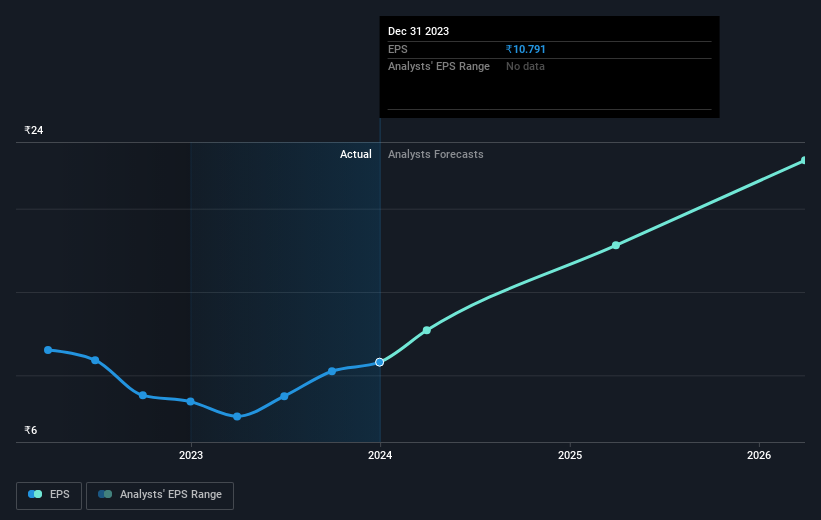Hatsun Agro Product (NSE:HATSUN) sheds 4.0% this week, as yearly returns fall more in line with earnings growth

The worst result, after buying shares in a company (assuming no leverage), would be if you lose all the money you put in. But on the bright side, you can make far more than 100% on a really good stock. Long term Hatsun Agro Product Limited (NSE:HATSUN) shareholders would be well aware of this, since the stock is up 123% in five years. Unfortunately, though, the stock has dropped 4.0% over a week.
Although Hatsun Agro Product has shed ₹10b from its market cap this week, let's take a look at its longer term fundamental trends and see if they've driven returns.
See our latest analysis for Hatsun Agro Product
In his essay The Superinvestors of Graham-and-Doddsville Warren Buffett described how share prices do not always rationally reflect the value of a business. One flawed but reasonable way to assess how sentiment around a company has changed is to compare the earnings per share (EPS) with the share price.
During five years of share price growth, Hatsun Agro Product achieved compound earnings per share (EPS) growth of 18% per year. So the EPS growth rate is rather close to the annualized share price gain of 17% per year. That suggests that the market sentiment around the company hasn't changed much over that time. In fact, the share price seems to largely reflect the EPS growth.
The image below shows how EPS has tracked over time (if you click on the image you can see greater detail).

It's probably worth noting that the CEO is paid less than the median at similar sized companies. It's always worth keeping an eye on CEO pay, but a more important question is whether the company will grow earnings throughout the years. Dive deeper into the earnings by checking this interactive graph of Hatsun Agro Product's earnings, revenue and cash flow.
What About Dividends?
It is important to consider the total shareholder return, as well as the share price return, for any given stock. The TSR incorporates the value of any spin-offs or discounted capital raisings, along with any dividends, based on the assumption that the dividends are reinvested. It's fair to say that the TSR gives a more complete picture for stocks that pay a dividend. We note that for Hatsun Agro Product the TSR over the last 5 years was 137%, which is better than the share price return mentioned above. And there's no prize for guessing that the dividend payments largely explain the divergence!
A Different Perspective
Hatsun Agro Product shareholders are up 26% for the year (even including dividends). Unfortunately this falls short of the market return. The silver lining is that the gain was actually better than the average annual return of 19% per year over five year. This suggests the company might be improving over time. It's always interesting to track share price performance over the longer term. But to understand Hatsun Agro Product better, we need to consider many other factors. To that end, you should learn about the 2 warning signs we've spotted with Hatsun Agro Product (including 1 which is potentially serious) .
Of course Hatsun Agro Product may not be the best stock to buy. So you may wish to see this free collection of growth stocks.
Please note, the market returns quoted in this article reflect the market weighted average returns of stocks that currently trade on Indian exchanges.
Valuation is complex, but we're here to simplify it.
Discover if Hatsun Agro Product might be undervalued or overvalued with our detailed analysis, featuring fair value estimates, potential risks, dividends, insider trades, and its financial condition.
Access Free AnalysisHave feedback on this article? Concerned about the content? Get in touch with us directly. Alternatively, email editorial-team (at) simplywallst.com.
This article by Simply Wall St is general in nature. We provide commentary based on historical data and analyst forecasts only using an unbiased methodology and our articles are not intended to be financial advice. It does not constitute a recommendation to buy or sell any stock, and does not take account of your objectives, or your financial situation. We aim to bring you long-term focused analysis driven by fundamental data. Note that our analysis may not factor in the latest price-sensitive company announcements or qualitative material. Simply Wall St has no position in any stocks mentioned.
About NSEI:HATSUN
Hatsun Agro Product
Engages in manufacturing and marketing of milk, milk products, and cattle feed in India and internationally.
High growth potential with solid track record.
Similar Companies
Market Insights
Community Narratives




